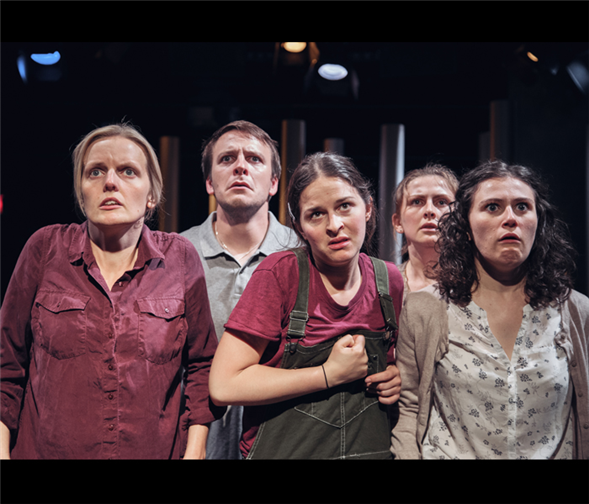Translate Page

A new play follows a community's fight to stay put
---
On the slope of a great mountain, in the rain-soaked south of Wales, there stands a tiny village. Most of the modest homes there line a single street, where a handful of families have lived and died for generations. But all is not well. After a government official declares the mountain unsafe – despite a lack of evidence – a family and their neighbors may have to rip their roots from the ground and start afresh down the mountain.
Throughout The Good Earth, a drama that was devised by the Welsh company Motherlode and that runs through Saturday at the Flea Theater, the characters watch goings-on in and around their village: a meteor shower lights up the night sky; fish dart about a stream; children file into school after recess. They often see these banalities and wonders while simply gazing into the audience.
And yet, even though they're looking at a roomful of strangers, the performers seem to observe those nonexistent sights with great clarity. How did the company manage to envision their fictional Welsh hamlet so fully?
Well, they took a trip to a real one. And many trips at that. In 2014, they began a residency at the Park and Dare Hall in Treorchy, a tucked-away town in the heart of the Rhondda Valley (also in the south of Wales), where coal mining once boomed and then burst, plunging some towns into poverty.
Director and performer Rachael Boulton says she knew the company's firsthand experience of that village and its surroundings would bring truth and precision to their work: "Honesty for us was always the key. And we always felt that if we saw the places that we'd been to [in our mind's eye], then the audience would as well."
Each morning they traveled over an hour, either by train or by car, from the bustling capital, Cardiff, past the quiet, terraced cottages that dot the foot of the valley.
Boulton recalls the commute as a journey into a world of topographical extremes: "When you enter the Rhondda Valley, you know you're entering. You drive through on a tiny, tiny road and there's just sweeping mountains on either side."
The company soon saw the mountains as both beautiful and menacing. On one hand, they admired the landscape during regular hikes. But on the other, Boulton says, "It's very oppressive. [The mountains] more easily feel like they're coming in on top of you."
It didn't take long for the tight-knit community to note the new arrivals. "If you're not local, people know," Boulton recalls. Similarly, villagers gathered in a pub in The Good Earth immediately ask questions about a stranger named Brian, that government official who strolls into town with grim tidings.
While developing their characters, the company recalled the townspeople's "willingness to have a joke," as well as their barbed yet loving sense of humor. "Insults are almost a form of endearment," Boulton says.
Because Motherlode has so fully envisioned the village in The Good Earth, the audience understands just how much the villagers stand to lose if they relocate. That in turn allows spectators to appreciate what Boulton sees as the villagers' most salient characteristic: Pride. Pride in where they come from, and pride that won't let them leave without a fight.
As Boulton puts it: "When you have a lot taken away from you, and you have a lot of pride still, you're going to want to hold onto that as much as you can."
---
TDF Members: At press time, discount tickets were available for The Good Earth. Go here to browse our current offers.
Gavin Whitehead is a writer and dramaturg based in New Haven.
Photos by Tom Flannery. Top photo: The cast of The Good Earth.